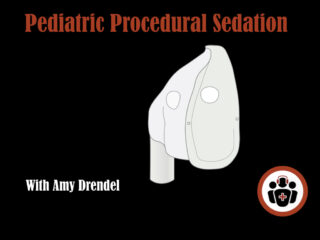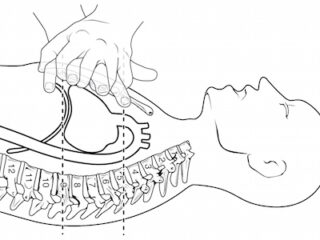
Episode 76 Pediatric Procedural Sedation
In this EM Cases episode on Pediatric Procedural Sedation with Dr. Amy Drendel, a world leader in pediatric pain management and procedural sedation research, we discuss how best to manage pain and anxiety in three situations in the ED: the child with a painful fracture, the child who requires imaging in the radiology department and the child who requires a lumbar puncture. Without a solid understanding and knowledge of the various options available to you for high quality procedural sedation, you inevitably get left with a screaming suffering child, upset and angry parents and endless frustration doe you. It can make or break an ED shift. With finesse and expertise, Dr. Drendel answers such questions as: What are the risk factors for a failed Pediatric Procedural Sedation? Why is IV Ketamine preferred over IM Ketamine? In what situations is Nitrous Oxide an ideal sedative? How long does a child need to be observed in the ED after Procedural Sedation? Do children need to have fasted before procedural sedation? What is the anxiolytic of choice for children requiring a CT scan? and many more...
Episode 75 Decision Making in EM – Cognitive Debiasing, Situational Awareness & Preferred Error
While knowledge acquisition is vital to developing your clinical skills as an EM provider, using that knowledge effectively for decision making in EM requires a whole other set of skills. In this EM Cases episode on Decision Making in EM Part 2 - Cognitive Debiasing, Situational Awareness & Preferred Error, we explore some of the concepts introduced in Episode 11 on Cognitive Decision Making like cognitive debiasing strategies, and some of the concepts introduced in Episode 62 Diagnostic Decision Making Part 1 like risk tolerance, with the goal of helping you gain insight into how we think and when to take action so you can ultimately take better care of your patients. Walter Himmel, Chris Hicks and David Dushenski answer questions such as: How do expert clinicians blend Type 1 and Type 2 thinking to make decisions? How do expert clinicians use their mistakes and reflect on their experience to improve their decision making skills? How can we mitigate the detrimental effects of affective bias, high decision density and decision fatigue that are so abundant in the ED? How can we use mental rehearsal to not only improve our procedural skills but also our team-based resuscitation skills? How can we improve our situational awareness to make our clinical assessments more robust? How can anticipatory guidance improve the care of your non-critical patients as well as the flow of a resuscitation? How can understanding the concept of preferred error help us make critical time-sensitive decisions? and many more important decision making in EM nuggets...
Episode 74 Opioid Misuse in Emergency Medicine
Pain leads to suffering. Opioid misuse leads to suffering. We strive to avoid both for our patients. On the one hand, treating pain is one of the most important things we do in emergency medicine [...]
Episode 73 Emergency Management of Pediatric Seizures
Pediatric seizures are common. So common that about 5% of all children will have a seizure by the time they’re 16 years old. If any of you have been parents of a child who suddenly starts seizing, you’ll know intimately how terrifying it can be. While most of the kids who present to the ED with a seizure will end up being diagnosed with a benign simple febrile seizure, some kids will suffer from complex febrile seizures, requiring some more thought, work-up and management, while others will have afebrile seizures which are a whole other kettle of fish. We need to know how to differentiate these entities, how to work-them up and how to manage them in the ED. At the other end of the spectrum of disease there is status epilepticus – a true emergency with a scary mortality rate - where you need to act fast and know your algorithms like the back of your hand. This topic was chosen based on a nation-wide needs assessment study conducted by TREKK (Translating Emergency Knowledge for Kids), a collaborator with EM Cases. With the help of two of Canada’s Pediatric Emergency Medicine seizure experts hand picked by TREKK, Dr. Lawrence Richer and Dr. Angelo Mikrogianakis, we’ll give you the all the tools you need to approach the child who presents to the ED with seizure with the utmost confidence.
Episode 72 ACLS Guidelines 2015 Post Arrest Care
Once we've achieved ROSC our job is not over. Good post-arrest care involves maintaining blood pressure and cerebral perfusion, adequate sedation, cooling and preventing hyperthermia, considering antiarrhythmic medications, optimization of tissue oxygen delivery while avoiding hyperoxia, getting patients to PCI who need it, and looking for and treating the underlying cause. Dr. Lin and Dr. Morrison offer us their opinion on the new simplified approach to diagnosing the underlying cause of PEA arrests. We'll also discuss when it's time to terminate resuscitation or 'call the code' as well as some fascinating research on gender differences in cardiac arrest care. These co-authors of the guidelines will give us their vision of the future of cardiac arrest care and we'll wrap up the episode with a third opinion, so to speak: Dr. Weingart's take on the whole thing....
Episode 71 ACLS Guidelines 2015 – Cardiac Arrest Controversies Part 1
A lot has changed over the years when it comes to managing the adult in cardiac arrest. As a result, survival rates after cardiac arrest have risen steadily over the last decade. With the release of the 2015 American Heart Association ACLS Guidelines 2015 online on Oct 16th, while there aren’t a lot a big changes, there are many small but important changes we need to be aware of, and there still remains a lot of controversy. In light of knowing how to provide optimal cardio-cerebral resuscitation and improving patient outcomes, in this episode we’ll ask two Canadian co-authors of The Guidelines, Dr. Laurie Morrison and Dr. Steve Lin some of the most practice-changing and controversial questions.







